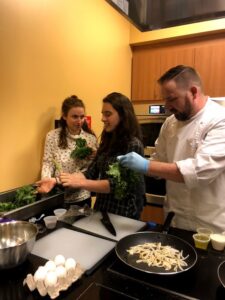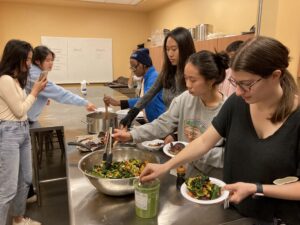Victories with Vegetables: A Plant-Based Cooking Demo at Emory University
- by Elise Kulers

Emory students pose after the cooking demonstration
Standing in front of a group of eager and talented cooking class participants in the Few Demo Kitchen at Emory University in Atlanta, Georgia, I couldn’t help but feel a wave of gratitude and familiarity. Back when I was a student at Emory a few short years ago, cooking demos with Slow Food Emory were one of the highlights of each semester, igniting the spark that led to a deep-seated love of talking and teaching about food.
This past year, Bon Appétit’s Food Education team has put concerted focus on kitchen literacy as we work to provide students with the tools and confidence to cook for themselves despite possible limitations in kitchen access, budget, and experience. My homecoming Fellow visit to Emory was no different— I excitedly joined forces with Slow Food Emory and Plant-Based Emory to host an interactive vegetable-packed grain bowl cooking class.

Then an Emory student, Elise (center) de-stems kale for an African squash and kale frittata during a 2018 plant-based cooking demonstration
As a campus chapter of the international movement, Slow Food Emory focuses on cooking and donating nutritious meals made with excess produce from farmers’ markets in Atlanta, and Plant-Based Emory seeks to build community around plant-based foods. Both are key players in Emory’s student-led sustainable food initiatives with primary goals of heightened awareness of food systems and increased access to nourishing, fresh foods to benefit people and the planet.
In order to make cooking and eating plant-based foods more accessible to Emory students, we decided to focus on versatile yet simple methods to cook a range of vegetables. These adaptable techniques can be applied to seasonal produce throughout the year, from roasting and sautéing to various raw preparations like making salads or pesto. One of the biggest motivations for this focus is the fact that switching to plant-based diets has the potential to reduce diet-related greenhouse gas emissions by nearly 50%, among numerous other environmental and wellness benefits.
The Oxford Organic Farm, Emory’s farm in Oxford, GA and a longtime Farm to Fork partner, provided a bounty of freshly harvested late-autumn produce to feature in our grain bowls. The 11-acre Certified Organic farm sells food to the Bon Appétit teams at both Emory’s Atlanta and Oxford campuses, as well as farmers’ markets and a Community Supported Agriculture program. It also employs a number of students and serves as a living laboratory for Oxford students and community members.
Our 20 cooking class participants divided up into four teams, each responsible for a different vegetable preparation technique. One group roasted an array of colorful root vegetables, including carrots, red beets, and both purple and orange sweet potatoes. The second team made a delightful romaine and Tuscan kale salad with shredded carrots, dried cherries, and slivered almonds, tossed with a lemon-garlic vinaigrette. Our third group sautéed Hakurei turnips with a simple orange-molasses glaze, cooked down with turnip and beet greens. Our grain bowls would be incomplete without their farro and lentil base, which the fourth group prepared, along with a bright green, vegan spinach pesto made with nutritional yeast and toasted pecans.

Students dish up!
In a flurry of well-organized kitchen activity, our four groups quickly chopped, simmered, mixed, and assembled the various components of the meal, bringing everything together in just under an hour. We enjoyed a beautiful rainbow of vegetables atop a bed of grains, showcasing the accessibility of nourishing, and not to mention delicious, low-carbon meals.
After the cooking demo and my visit to Emory came to a close, I was struck by the full-circle nature of it all: my return to the place where it all began, the continuity of the work I’d started as a student, and the hope of inspiring the next generation of food leaders through the Bon Appétit Fellowship.